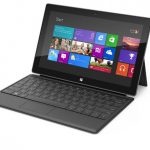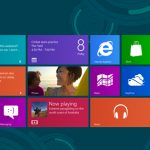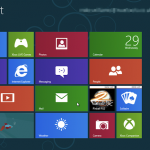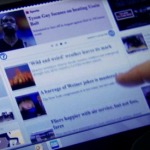There are many reasons for the recent PC sales slump

Windows 8 is not the direct cause for poor PC sales, and to suggest this is simply sensationalism. True, the operating system received cool reception from some people, but most don't realize that Microsoft had little choice to do what it did. The company distributed the first Preview during the BUILD developer conference in autumn 2011, and I immediately recognized what was going on. Windows 8 is all about touch and mobile. Mobile touch devices are replacing computers among many consumers. Microsoft likely saw this and had to do something. That something is Windows 8. I discuss this consumerization of the PC market in my late-March BetaNews story.
What some people fail to appreciate is that a PC is more than a consumer device. Windows is more than a mobile operating system. It is very complex, designed for heavy-duty work. Microsoft had one of two choices: Create a totally new operating system for mobile and leave Windows as is; merge a mobile operating system into Windows so it is a hybrid. That the company chose the latter is ingenious, but risky. Likely we won't know until years from now whether or not Microsoft wisely, but it is a noble undertaking nonetheless.
Windows Blue won't be the end of the Desktop UI

Tech journalists are talking about what Windows Blue will mean for the future of Windows. Actually, no matter what anyone suggests, only Microsoft really knows what it has planned for future versions. What really is important though is how changes to the operating system will affect software developers, plus businesses, and why considering this may be far more important in the long run.
In recent years we have seen the over-consumerization of computers, in particular the shift from desktop PCs to tablets and other portable devices. Everything seems to be all about mobile today. But is mobile and touch the future of computers ?
Remembering the creator of Turbo Basic

BASIC programmers who have been around awhile likely remember Borland Internationals Turbo Basic. What few may realize though is that Borland did not create Turbo Basic. Bob Zale did. They purchased the rights to his compiler, which was derived from his previous compiler, Basic/Z and named it Turbo Basic. Borland eventually left the compiler market and Turbo Basic was one of the first of their languages to go. Again most people do not realize that Turbo Basic didn't die, but Borland simply sold back the rights to its creator, Bob Zale, and he renamed it PowerBasic and it is still around today, albeit in a different form.
Sadly, Zale died on November 6 at the age of 66. He will be sorely missed, not only by his family and coworkers at PowerBasic, but by many thousands of BASIC programmers, some of whom have used programming language since the days of Turbo Basic or even the earlier Basic/Z.
What Windows 8 needs to succeed

As a long-time Windows user, as well as software developer, I have pondered about what would make Windows 8 and the new modern UI (aka. Metro) a success. Microsoft can spit and polish the operating system, but people will interact more with applications. As good as Windows 8 might be, it won't satisfy if the apps aren't good enough.
That's why I believe Microsoft needs to rethink Windows Store. One isn't enough for Windows 8. There needs to be a second Signature store that offers only the highest-quality apps, however few they be. I'll explain.
HP should save the enterprise from Windows 8

With Microsoft bringing their own branded tablets to market, what is left for major OEMs like Hewlett Packard? One's first reaction may be to consider trying to do one better with the hardware. While this is still possible, maybe HP should consider getting back into the software business.
HP is making a good decision by concentrating on the x86 platform, rather than ARM in future tablets. Windows RT is untested at this point. Also Windows RT will not run the huge existing x86 based Windows software base that dwarfs any current app store in quantity and quality. There can be many advantages to HP's current decision.
Microsoft Surface gets a positive response from this Windows developer

After seeing the latest information about Microsoft's new Surface tablet computers and also reading Joe Wilcox's latest article about them, I finally get Microsoft's mindset -- and I am impressed. So what does this Windows developer think of Surface? Need a tablet to appreciate what it is all about.
I don't have deep pockets, so I try to use my computers as long as possible, but after hearing about Windows 8, I knew I needed to get a tablet as soon as possible. Something big was afoot! Fortunately Microsoft made is easier for me when the Microsoft Store had an amazing deal on an ExoPC Windows tablet for only $399. I jumped on that deal, and I think it was the right one.
Windows 8 needs a little more work

Windows 8 gets a poor grade on a simple task. What is that task you may ask? Read on.
Every Windows computer needs a beginners programming language. Those of us from the DOS days can look back fondly on QBasic. From learning how to program, to just having a quick and easy scripting language that a business user can use to write some simple app in a few minutes, a beginners language makes sense. So what beginners programming language might fit the bill for Windows 8? Microsoft's own Small Basic!
Six lessons I learned about writing software

From independent software developers to the enterprise, everyone is looking for ways to improve software development, increasing productivity while not sacrificing performance. Software technologies continue to change, but have programmers really found the real keys to faster development cycles, more reliable software and improved performance?
While it is obvious we have more powerful software today, this does not mean we have better software today. As it becomes more complex, there are more things that can go wrong. In the old days, software was often written by a single programmer, while today software often is written by teams. The complexity alone of trying to get a team of programmers to work together is challenging enough, but add to this the size and scope of some applications that can be hundreds of thousands of lines of code, if not possibly in the millions of lines of code, and you can have a veritible nightmare trying to put it all together. Few trades today require so much attention to details at such a large scope as does programming.
Software performance matters

The issue with the soon-to-come generation of Windows mobile computers (tablets) of performance versus productivity, when it comes to software development, looms on all of us programmers who desire to write software for Windows 8. As a longtime Windows API programmer I appear to be in the minority, but I just can't help but ask the question: "Do programmers just not get it?"
I have watched the video of a talk by Microsoft's Herb Sutter entitled "Why C++?" more than once and even though I don't use C++, I just can't help but appreciate his points about the importance of performance, especially when it comes to the next generation of mobile devices.
How suitable is Windows 8 Metro for business developers?

What is Metro, Windows 8's new user interace motif, really all about? Does it fill all the needs of Windows users? Is Metro for consumers or for businesses? What does this all mean for the legacy desktop? These are some of the questions I hope to answer.
First let me say that I do not dislike Metro, and I don't want to give the impression that the new user interface is somehow terrible or a mistake. Microsoft has put a lot of work into Metro and some of the reasons for it does make a lot of sense. My perspective though as a programmer is based on the fact that the majority of software I have written over the years has been for businesses and not for consumers. Metro may very well be a success with consumers, but what about businesses?
Take away developers' PCs and send them to Walmart

Why is it so hard to get developers to realize the software they design is slow, bloated and does not have the "fast and fluid" experience we all would like? End users may not appreciate this about many programmers and their mindset, but many developers don't like to use old computers? They love their technology and demand leading-edge PCs.
Maybe it's time to take away their computers, and send them to Walmart to buy new ones.
Has programming lost its way? Part Two

Whether you are an engineer, a designer, a programmer or of any other trade that requires skill, the one lesson many have been taught early on is "keep it simple". Sadly this lesson is often lost in the name of progress, especially when it comes to programming.
Let me give you one example. I know this won't go over well with most programmers, but it needs to be said. Languages like C++ simply are not simple by design. Object-oriented programming, while possibly having some value for specific tasks, does not make programming simpler. I would venture to say that the so-called benefits of object-oriented programming has more to do with the feature set of the higher level objects that some languages provide, more so than it being accomplished using OOP.
Intel's Studybook can be a success

Intel is putting more effort into their Atom CPU series, especially for the next generation of tablet computers. Along those lines, yesterday's Intel Studybook tablet is exciting. I really like the idea of this tablet. As the name implies, Studybook is a 7-inch tablet running Windows 7 or Android 3.x designed for students.
There is one challenge, though, and that is the Atom CPU, especially if such tablets use Windows instead of another operating system. So, is the Atom microprocessor up to the task?
BASIC: Making a case for an old favorite

Are you looking for a way to increase productivity when it comes to your software development? Are you willing to try something different? How would you like to speed up software development, decrease time spent on software maintenance and improve the reliability of your software?
Many a long-time C programmer will likely tell you that C (or C++, C#) is the only serious programming language worth using today in business or the enterprise. To even suggest otherwise would likely make one a laughing stock by one's peers. Yet think about this for just a moment: Of all the software projects you or your company have undertaken, how many of them have come in over budget? How many have actually failed completely? How many, though finished, were plagued with bugs that never seem to get resolved? How easy has it been to maintain such projects, years after they were developed?
Windows tablets and the enterprise, what's the problem?

I have repeatedly read how Windows 7 is not well-suited to touch, which is the reason some people are waiting for Windows 8 before buying a tablet. Microsoft's solution is Metro -- the next generation touch interface for Windows. Yes, Metro is touch friendly, but is it really the answer to the enterprise when it comes to Windows tablets?
Windows 7 is not any less suited to touch and a tablet PC than Windows 8. Sure Windows 8 does offer a few perks that make touch better as far as the operating system is concerned, such a better on-screen keyboard. But as far as applications a business may want to design themselves specific to tablets, I don't see any advantage Windows 8 has over Windows 7.
Chris's Bio
Chris Boss owns Computer Workshop, which is a software development business. Computer Workshop has been in business since the late 80's. Originally he developed custom software for local businesses. Now he develops programming tools for use with the PowerBasic compiler. His primary product is called EZGUI Professional version 5.0, which was developed about 10 years ago. Chris is advanced Windows API programmer and EZGUI was written using the PowerBasic compilers.
© 1998-2024 BetaNews, Inc. All Rights Reserved. Privacy Policy - Cookie Policy.
